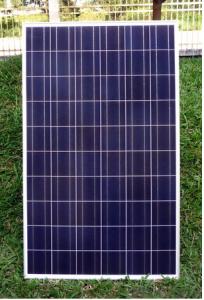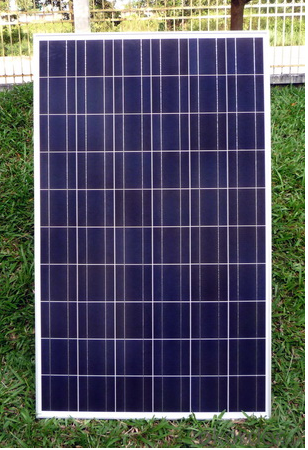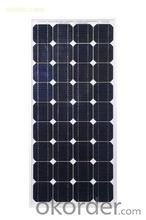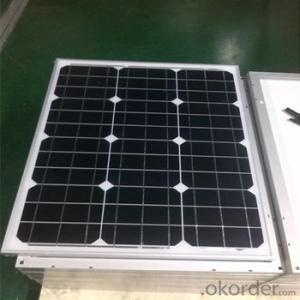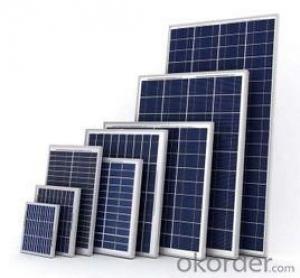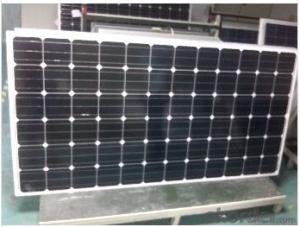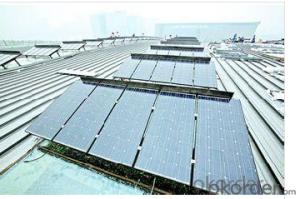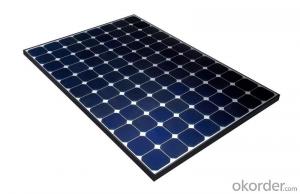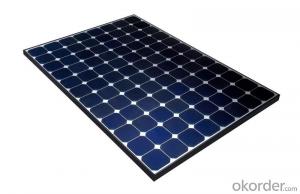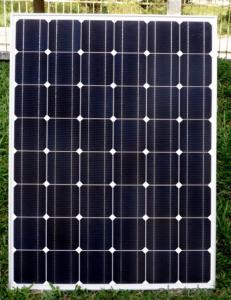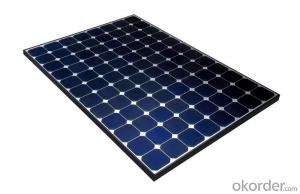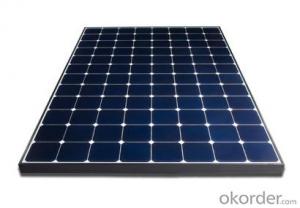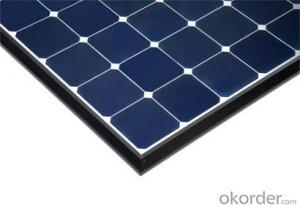Eclipse Series CNBM Poly 175W Solar Panel with TUV UL CE Certificate for Residential
- Loading Port:
- Shanghai
- Payment Terms:
- TT OR LC
- Min Order Qty:
- 100 watt
- Supply Capability:
- 1000 watt/month
OKorder Service Pledge
OKorder Financial Service
You Might Also Like
Specification
CNBM Poly 170W Solar Panel with TUV UL CE Certificate For Residential
Introduction
Solar modules use light energy (photons) from the sun to generate electricity through the photovoltaic effect. The majority of modules use wafer-based crystalline silicon cells or thin-film cells based on cadmium telluride or silicon. The structural (load carrying) member of a module can either be the top layer or the back layer. Cells must also be protected from mechanical damage and moisture. Most solar modules are rigid, but semi-flexible ones are available, based on thin-film cells.
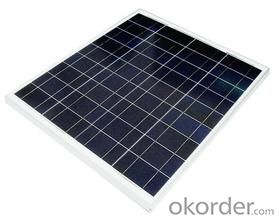
Suggested application
Home lighting business lighting,
Garden lighting, pavement lighting
Farmer household lighting
Decorative water pump
Traffic signal lighting
Industry area
Business area
Solar Power Plant
Product feature
Modules are made of Monocrystalline or Polycrystalline Silicon cell.
Materials and color of the solar panel frame: Clear anodized aluminum alloy type 6063T5 Universal frame; Silver-white color;
The output connection gathers the coupling: Selects conforms to the IEC-612615; 2005, class II, IEC61730 international standard; Airtight waterproofing binding clamp;
Module seal structure: The surface is thick, the high diaphanous rate armored glass with solar cell board special-purpose 3.2mm becomes after the high temperature lamination craft. The back selects has waterproof and anti- aged performance fine TPT materials. The entire block battery board has, the waterproofing, the anti- aging airtight and so on the fine performance;
Power tolerance: +/-3%
Packaging
International standard cartons (according to the requirements of customers)
- Q: Can solar panels be installed on a garage or carport?
- Yes, solar panels can be installed on a garage or carport. These structures often provide ample space and a suitable angle for solar panel installation, allowing homeowners to generate clean and renewable energy while utilizing the available space efficiently. Installing solar panels on a garage or carport can also provide additional benefits such as shade for vehicles, reduced utility bills, and the opportunity to contribute to a greener environment.
- Q: Ok so if i wanted to put a solar panel on my house and i live where it snows, will that be a problem? If the snow covers the solar panel will that be a problem? If so then do i have to climb on my roof and clear it off or what?
- In my experience the snow usually slides off by itself. There have been times when it's snowed heavily and I've had to clean it off but it does not tend to be the norm.
- Q: i already have solar/gas water heating, but was wondering if getting solar panels for electricity installed was a good idea.
- Create okorder
- Q: Do solar panels require a battery backup system?
- No, solar panels do not require a battery backup system, but it can be beneficial to have one for storing excess energy for use during cloudy days or at night.
- Q: Photosynthesis is fairly inefficient, but efficient enough to power all life on earth.
- Silicon is a very good conducter. Probably the best for electricity.
- Q: Can solar panels be installed on art installations or sculptures?
- Yes, solar panels can be installed on art installations or sculptures. In fact, integrating solar panels into art installations and sculptures has become a popular trend in recent years. This allows for the creation of sustainable and eco-friendly artworks that can generate renewable energy. Additionally, the combination of solar panels and art offers an innovative way to raise awareness about renewable energy and environmental issues.
- Q: I am in the market for buying a home. There is one for salke that actually has solar panels on top. How are they used? Do you need to pay for gas and electric still. Does it really light up the house and keep it warm. WHat about the AC keeping hte house cool in the summer does it work for that too? Please explain in solar for dummy terms. I haveno clue about solar panels other thatn the fact that it needs sunlight to run.
- I think that rustoria67 bumped his head on some thing. There are thousands of homes using only solar panels to power their homes, and it no way near an acre of them. With the right setup Kw of panels will work. Remember one can't bring a boat to an airplane race and hope to win. Look at this link.
- Q: I have 2 20 watt Solar panel. I have it hooked up to solar controller and batteries to inverter. Am trying to figure out how much watts am getting. I found the voltage but how do I find the amp reading on a mutimeter?
- It is possible your meter does not have the capacity to safely measure more than 300 milliamps which is too small to measure current output from solar panels. Assuming no losses in the system or components, if your meter does not have the capacity to measure 0 Amps, you will need to get one that does. Analogs are better than digitial for this. Most often the 0 Amp circuit of the meter has a discrete positive plug location for the positive test lead. Most have a common ground connection with the rest of the meter functions. If you are measuring current at the battery in the charge mode- Negative lead of meter goes to positive terminal of battery and positive lead of meter goes to the cable that was connected to the positive terminal of the battery. Since the Wattage is a nominal measurement, if you measure between the panel and controller, take measurement on one leg of the panel, as you want to measure the current with the loaded active circuit. Meter is oriented the same way as the measurement at the battery would be made above only this time the meter is between the panel and controller. At peak solar conditions, expect current to be measured at 2.5 to3 Amps or more per panel. Under optimal conditions your panel will have higher output than their ratings indicate. Open circuit can be close to 20 volts. Never short circuit the output of the solar panels. It is volts multiplied by amps that gives you Watts.
- Q: Polycrystalline solar panels are good or single crystal solar energy is good
- Polycrystalline silicon solar cell production process and monocrystalline silicon solar cell almost, but the polysilicon solar cell photoelectric conversion efficiency will have to reduce a lot of its photoelectric conversion efficiency of about 12% (
- Q: I'm thinking of getting a solar panel for my house to help cut back on power use (I live in New Mexico). What sort of appliances can I run on a watt solar panel? Is it worth it to get a single watt panel or is it more efficient to get a multi-watt panel?
- watt is a very small amount of electricity. The typical household uses several million watt hours per year. watt would be enough to trickle charge a battery to run an LED nightlight. I believe the little self contained walk lights that I have put out have a 0.35 watt Ni-Cad battery. That could be recharged by a watt solar panel.
Send your message to us
Eclipse Series CNBM Poly 175W Solar Panel with TUV UL CE Certificate for Residential
- Loading Port:
- Shanghai
- Payment Terms:
- TT OR LC
- Min Order Qty:
- 100 watt
- Supply Capability:
- 1000 watt/month
OKorder Service Pledge
OKorder Financial Service
Similar products
Hot products
Hot Searches
